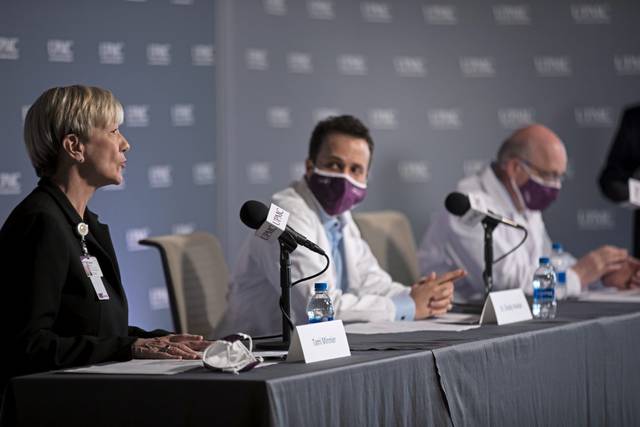https://triblive.com/local/regional/upmc-covid-vaccine-may-not-be-as-effective-for-immune-compromised/
UPMC: Covid vaccine may not be as effective for immune-compromised

UPMC experts on Friday shared new data related to the effectiveness of the covid-19 vaccines on patients with compromised immune systems – suggesting that, for some people, the vaccines are less effective at preventing infection.
Researchers searched for antibodies via blood tests of 70 volunteer residents of UPMC Senior Communities, as well as 67 patients with cancers affecting blood, bone marrow and lymph nodes. Samples were taken a few weeks after volunteers had been fully vaccinated.
All of the elderly patients developed antibodies against the coronavirus, said Dr. David Nace, chief medical officer of UPMC Senior Communities. But some developed fewer than others.
“The levels varied significantly among individuals, but all of them had antibodies, and I do want to reinforce that point,” he said. “I also need to caution: because we know that while there is an antibody response to the vaccine, we don’t know how good of an antibody response it is.”
Nace said that, within UPMC facilities, there were some infections even after vaccination. But he said those infections were all asymptomatic, suggesting that even with fewer antibodies, the vaccine was offering some level of protection to older people.
Among the blood cancer patients, however, antibody development was more nuanced. Dr. Ghady Haidar, a UPMC transplant infectious diseases physician, said 54% of the patients’ blood who had been sampled produced detectable antibodies, while 46% did not.
There was a subset of patients with a specific type of blood cancer called chronic lymphocytic leukemia (CLL) who were tested: 77% of CLL patients did not produce any antibodies.
Haidar emphasized that while a sizeable portion of the patients didn’t develop the antibodies, more than half did — which he said is “relatively effective.”
“This finding does not mean that the vaccine did not work in these subgroups of patients, because honestly there’s a lot more to our immune system than just antibodies,” he added.
Haidar and Nace said they weren’t surprised by the results: immune-compromised patients, including the elderly, already have diminished responses to most vaccines, such as the influenza vaccine.
“I was absolutely expecting this,” Haidar said. “If you go by the influenza literature, for example, there’s a lot of data out there in people with cancer and transplants that show such people don’t respond to vaccines as well as people with normal immune systems. I didn’t find our findings surprising.”
The data shared reflects only UPMC patients, though physicians said the findings are consistent with studies in other areas. It also focuses only on two groups of the immune-compromised, those with blood cancers and the elderly. The researchers did not test those with other cancers, HIV patients, organ recipients or others with compromised immune systems.
“This isn’t the end of the story; we’re continuing to expand this work,” Haidar said. “We really want to know why these patients didn’t produce antibodies … and we’re also interested in other groups of immunocompromised patients.”
The UPMC research has not yet been peer-reviewed by other scientists. The doctors said the health system was compelled to share the new information as quickly as possible.
“I don’t want patients like this throwing caution to the wind and not masking and not social distancing,” Haidar said. “We need to emphasize to patients like this that you may not be fully protected, so please, please, please continue taking the usual precautions.”
The results suggests that people should continue following public health restrictions, remaining vigilant, even after becoming fully vaccinated – especially if they are immune-compromised or are around someone who is, the physicians said.
Nace said the results, specifically the success among long-term care residents, give a call to action for long-term care facilities to move forward with reopening some restrictions, like visitation.
“That’s part of the reason why we did this study,” Nace said. “It does mean that we should proceed with reopening. It should not restrict us. We do need to be thoughtful. We need to be cautious. … But we really should be taking efforts to start decreasing the negative impacts of social isolation on individuals and start to reopen these facilities.”
The doctors again encouraged individuals who do develop covid-19, even after vaccination, to seek out monoclonal antibody treatment, a therapy that uses intravenous (IV) infusion of antibodies that seek out and block the coronavirus from infecting a patient’s cells.
Since promoting the treatment enthusiastically in a news conference two weeks ago, Tami Minnier, chief quality officer, said demand for the antibody infusion at UPMC facilities has quadrupled. The system has provided the treatment for more people in the last three weeks than it has since its authorization by the U.S. Food and Drug Administration in December.
UPMC physicians still recommend that all eligible people – including the immune-compromised discussed Friday – get vaccinated for covid-19.
Minnier said UPMC has administered more than 364,000 doses systemwide, including nearly 233,000 people who were not affiliated with UPMC. Last week alone, 40,000 doses were administered, she said.
UPMC, with the Pittsburgh Penguins and the Allegheny County Health Department, will next week host a drive-thru clinic at the Pittsburgh Mills mall in Frazer, where it estimates 12,000 doses of the Johnson & Johnson vaccine will be given.
Copyright ©2026— Trib Total Media, LLC (TribLIVE.com)
